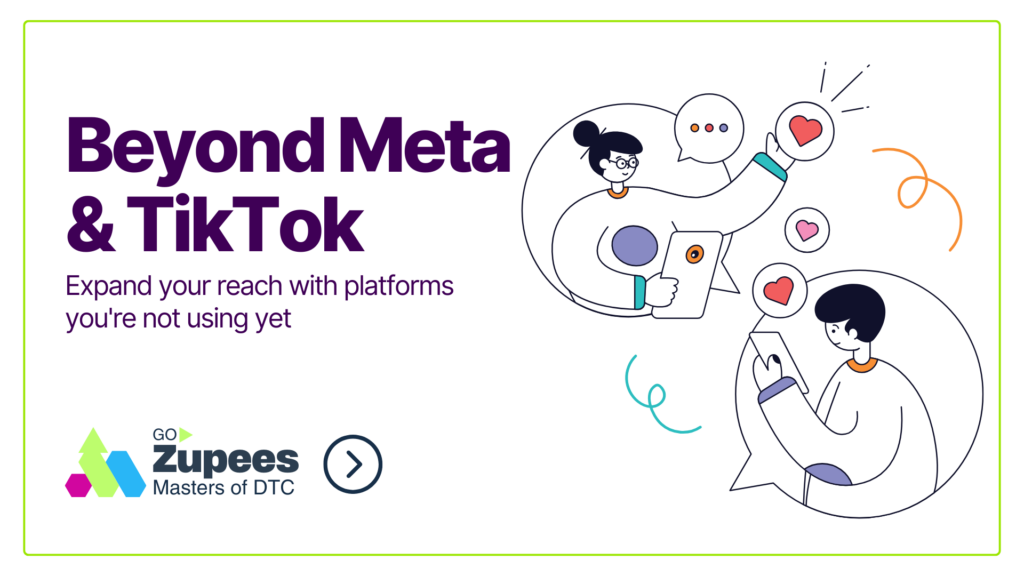Why Affiliate Marketing is a Powerful Tool for DTC Brands
Direct-to-consumer (DTC) brands have disrupted traditional retail by selling directly to consumers online. However, they still rely on a limited set of channels for new customer acquisition
Read this article to learn why this is detrimental to your growth in the long term and how future focused brands are mitigating the risk of over-reliance on one or two channels.
Affiliate marketing, with its focus on partnerships with affiliates, influencers, and commerce content partners, offers a compelling solution.
Key Advantages of Affiliate Marketing Over Paid Media:
-
-
Increased Brand Reach and Awareness:
- Access to New Audiences: Affiliates, influencers, and content partners have established followings, allowing brands to tap into new customer segments.
- Amplified Brand Messaging: Partner content organically promotes the brand, increasing visibility and awareness.
-
Performance-First Model:
- Pay-for-Performance: Brands only pay when a sale is generated, reducing risk and optimizing marketing spend.
- Scalability: The program can be scaled up or down based on performance, ensuring efficient resource allocation.
-
Cost-Effectiveness:
- Lower Acquisition Costs: Affiliate marketing often yields higher ROI compared to traditional advertising channels.
- Reduced Marketing Expenses: Partner content creation and promotion are handled by affiliates, lowering costs for DTC brands.
-
Enhanced Brand Credibility:
- Authentic Endorsements: Customers trust recommendations from influencers and content creators they follow.
- Social Proof: Positive reviews and testimonials from affiliates build trust and credibility for the brand.
-
Data-Driven Insights:
- Performance Tracking: Affiliate marketing platforms provide detailed data on campaign performance, allowing for data-driven optimization.
- Customer Behavior Analysis: Understanding customer journeys through affiliate channels provides valuable insights for future marketing strategies.
-
The Interplay of Trust and Dependence:
Affiliate marketing fosters trust through authentic endorsements from influencers and content creators.
This organic approach resonates deeply with consumers, who are increasingly wary of intrusive advertising.
Conversely, paid media, especially when overused, can feel forced and inauthentic. This can lead to ad fatigue and erode consumer trust, diminishing the effectiveness of future campaigns.
The Tug of War Between Control and Ownership:
While paid media provides immediate control over messaging and targeting, it comes at the cost of ownership.
Brands are at the mercy of ever-changing platform algorithms and policies, leaving them vulnerable to sudden changes that can disrupt campaigns.
Affiliate marketing, on the other hand, leverages the established platforms and audiences of partners, granting brands a measure of indirect ownership over their marketing efforts.
A Case Against Paid Media for Scaling Growth
While paid media has its place in the marketing mix, over-reliance on it can be detrimental for DTC brands.
Here’s why:
-
High Costs and Diminishing Returns:
- Rising Costs: The cost of paid media channels like Google Ads and social media advertising is constantly increasing, making it harder for brands to compete.
- Ad Fatigue: Constant exposure to ads can lead to ad blindness and decreased engagement, reducing the effectiveness of paid campaigns.
-
Constant Creative Iteration and Optimization:
- High Resource Demands: Developing effective ad creatives requires significant time, resources, and expertise. This includes:
- Concepting and Design: Brainstorming creative ideas, designing compelling visuals, and crafting compelling ad copy.
- Testing and Iteration: Conducting A/B tests to determine which ad variations perform best, requiring ongoing analysis and optimization.
- Staying Current: Adapting creatives to evolving trends, platform updates, and audience preferences, demanding constant attention and updates.
- Reduced Focus on Core Business: The time and resources dedicated to managing paid advertising campaigns can divert attention from core business activities like product development, customer service, and building long-term brand value.
-
Short-Lived Results:
- Temporary Traffic: Paid media primarily drives short-term traffic spikes. Once the campaign ends, traffic often declines significantly, leaving DTC brands with little to no organic growth.
- Limited Brand Building: Paid ads are often focused on immediate conversions, neglecting long-term brand building and customer relationships.
-
Dependence on External Platforms:
- Platform Control: DTC brands are at the mercy of ever-changing algorithms and policies on platforms like Google and Facebook, which can significantly impact campaign performance.
- Limited Ownership: Paid media channels don’t belong to the DTC brand, meaning they have limited control over their marketing efforts and customer data.
-
Potential for Brand Dilution:
- Overreliance on Ads: Excessive use of paid advertising can dilute a brand’s message and make it harder to stand out from the competition.
- Inconsistent Branding: Paid ads can sometimes be inconsistent with a brand’s overall aesthetic and messaging, confusing customers.
-
Data Privacy Concerns:
- Limited Data Access: Increasing privacy regulations and restrictions on data collection can hinder the effectiveness of targeted advertising.
- Customer Trust: Overly intrusive or targeted ads can erode customer trust and damage brand reputation.
Conclusion
In conclusion, over-reliance on paid media can be a costly and unsustainable approach for DTC brands. By embracing the power of partnership marketing, DTC brands can unlock a potent channel for growth. Affiliate marketing, with its focus on authentic endorsements and performance-based rewards, offers a compelling alternative to traditional advertising. By leveraging the reach and influence of affiliates, influencers, and content partners, DTC brands can build lasting customer relationships, enhance brand credibility, and drive sustainable growth.
Ready to Explore the Power of Partnership Marketing?
Schedule a free consultation with our team to discuss how we can help you



